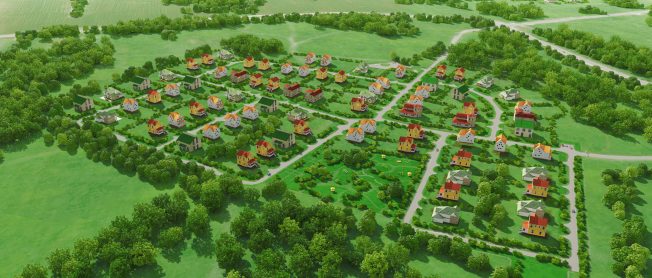Insurance for Real Estate Developers
 Get a Quote
Get a Quote
Coverage for Developers, Property Managers, Building Owners in Massachusetts and Beyond
Understanding insurance for real estate developers, property managers, building owners, and their lending institutions begins with an understanding of the unique types of risks these groups face. And with today’s mounting challenges–a global pandemic, sustainable building regulations, skilled labor shortages, etc.–the margin for error has maybe never been smaller. As experienced risk advisors in the property development space, we’re here to unpack the many complex exposures that come with acquiring land, obtaining plans and permits, building and remodeling work, renting, selling, or managing the finished property.
Contact our experts (508-339-2951) to get a fresh perspective on your current program and how it can be improved.
What are the recommended types of insurance for real estate developers?
- General Liability Insurance
- Professional Liability Insurance
- Builders Risk Insurance
- Business Interruption/Business Income Coverage
- Environmental Liability/Pollution Liability Insurance
- Flood Insurance
- Loss of Rents Coverage
- Repair & Replacement Coverage
Property developers generally need asset protection (Builders Risk, Property Insurance, and General Liability Insurance) and revenue protection (Loss of Rents, Repair and Replacement coverage). For those professionals who are actively involved in building or remodeling, Environmental Liability Insurance, Contractor’s Pollution, and/or Professional Liability are some other key coverages.
Apart from the specific policies themselves, it’s imperative that real estate insurance include 24/7 claims service and support, so that loss events don’t overly impact development timelines. Ensuring all the necessary coverages, along with best-in-class claims service, requires partnership with an agent who can access a wide selection of insurance carriers and programs. That’s us.
What does real estate/property management insurance cost?
It’s impossible to offer actual figures, given the broad scale of projects and properties (types and sizes) we represent. However, we can highlight some of the rating factors that go into real estate insurance pricing, for example: size of the land/scope of the project, project location, building values, construction occupancy protection exposure (COPE), demolition required (if any), and prior use. In every case, our team will conduct a thorough review of all exposures to develop an insurance program that is tailored to your unique risk profile.
Which trends in Massachusetts real estate development could impact insurance programs, going forward?
We know from sources like NAOIP Massachusetts, a commercial real estate development association, that opportunities abound–even amidst the pandemic and the financial uncertainties it has created. Biotech industry development appears to be a leading trend, with a steady demand for life science research and laboratory space in and around Boston. Residential development is still sorely needed in the city, even with more workers telecommuting. Meanwhile, some of that work-from-home exodus has prompted a surge in housing demand in rural Massachusetts, where 2020 home sales totaled far above average.
All told, the development boom isn’t ending, but for some (especially smaller developers and real estate investors) its profit margins may be narrowing. Land and material costs are way up. Building departments are backlogged. Contractors are busier than ever, which often translates into delays and, in some cases, shoddy work. Protracted timelines and declines in work quality mean that insurance–securing the right coverage at the most competitive rate–has never been so important.
We’re also seeing a push toward greener, more sustainable development. Already, proposed “stretch” codes for net-zero building requirements are in the works. Massachusetts developers will need to account not only for the increased costs involved , but the newfound risks. Professional liability policies will become increasingly important, to hedge against claims wherein green designs or building materials are incorrectly installed or otherwise run afoul of state and city regulations.
For more information on what’s happening in Massachusetts’ real estate development sector and how it affects your insurance program, contact our team at 508-339-2951.


